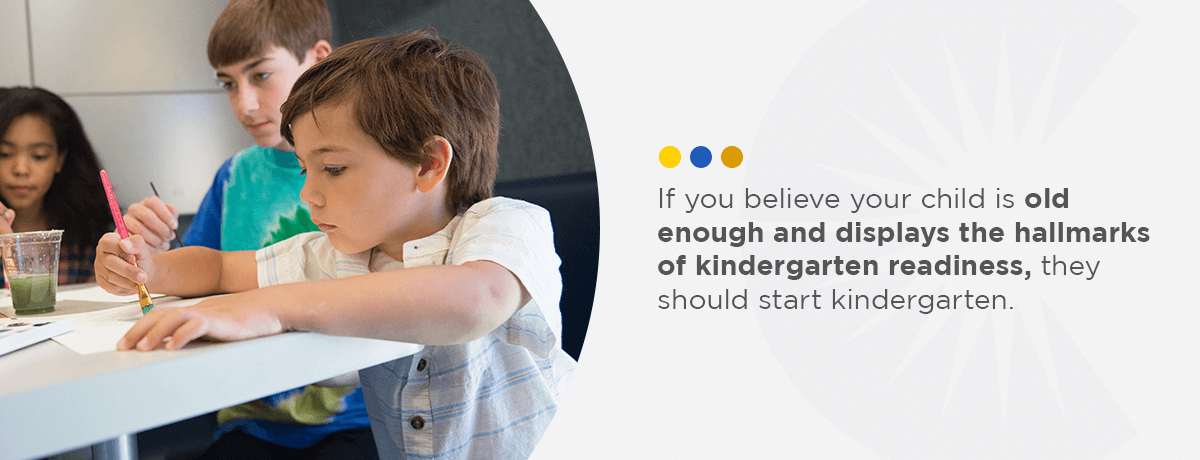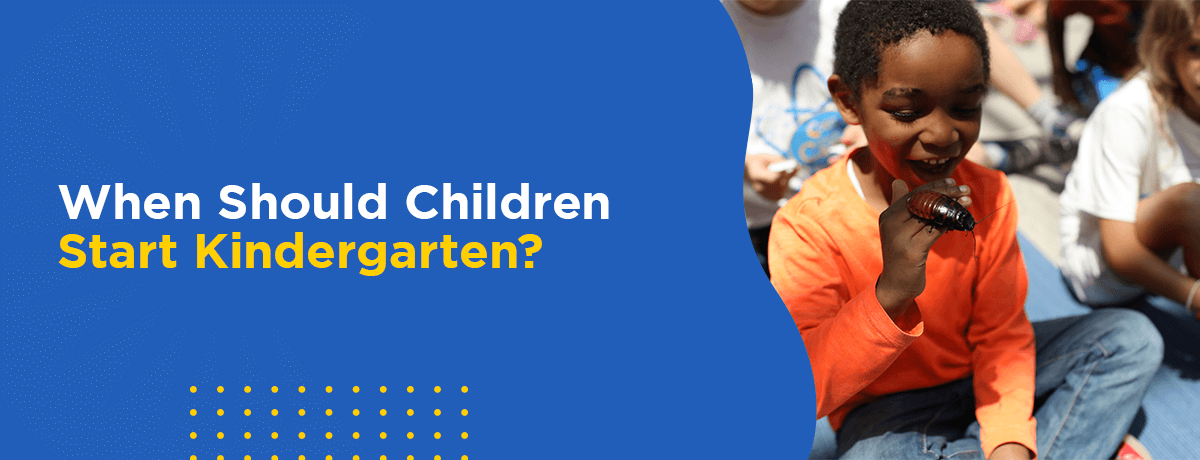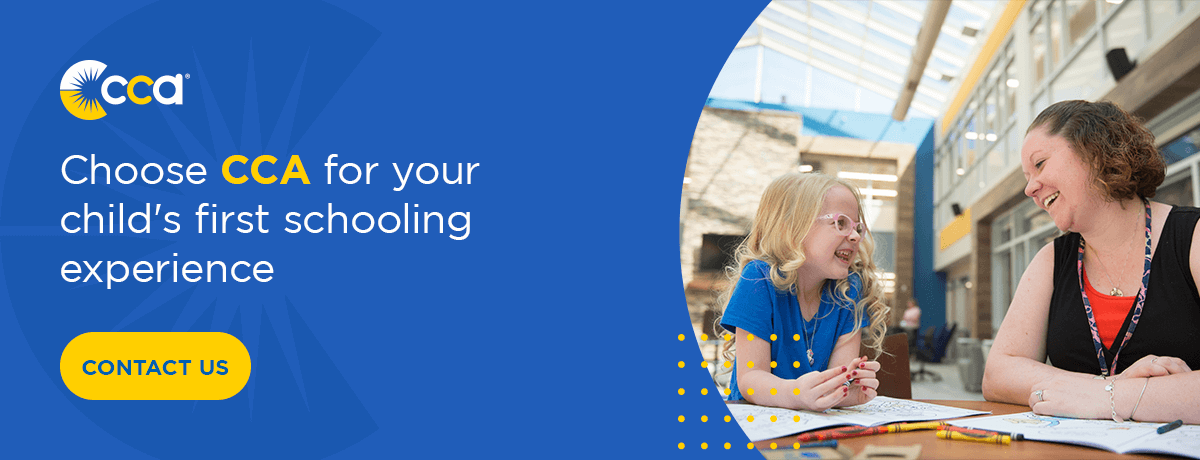Many parents question what is the right age for kindergarten, but the answer isn’t as simple as a single number. Several factors go into kindergarten readiness, but you shouldn’t decide to enter your child into kindergarten lightly, since it may be crucial to your child’s future academic and career success.
What Age Do Kids Usually Start Kindergarten?
What age a child can start kindergarten varies from state to state, but it usually lies around 4 to 6 years old. Most states are moving toward 5 years and include cutoff dates that dictate whether a student may start kindergarten if they aren’t quite 5 at the beginning of the year. For example, in Pennsylvania, kids start kindergarten around 5 years old, and the cutoff states kids must be no younger than 4 years and 7 months old at the start of the school year; however, the minimum entry age to enroll in kindergarten at CCA is based on the policies of your local school district of residence.
What If Your Child’s Birthday Falls Just After the Kindergarten Enrollment Cutoff Date?
For many parents, the enrollment cutoff date presents a challenge. While their child may technically be eligible to enter kindergarten, parents may not feel like their kid is ready — especially if their classmates would be almost a year older. The stark disparity in ages among kindergarteners can significantly impact classroom dynamics, with older students starting to read and write while younger ones might be further behind.
What Does “Redshirting Kindergarten” Mean?
“Redshirting” is becoming an accepted practice among parents who are worried about their child’s readiness for kindergarten. The term “redshirt” originated in college sports to describe athletes who practice with the team, but do not compete. So, redshirting kindergarten means parents delay entering their child into kindergarten, usually for a year or more.
Generally, parents hold their children back because they don’t believe they are socially, emotionally, or cognitively ready for kindergarten — and parents also think the decision will help their child academically. Redshirting can be a wise choice if parents connect their children with other forms of learning to prepare them for kindergarten, including preschool programming and online learning.
Could Redshirting Hinder Your Child’s Success?
There are various pros and cons to redshirting your child, but the decision is ultimately an individual one. While some studies report that redshirting results in better academic achievements, others document that older children may quickly become bored and less engaged in school. Similarly, while kids who enter kindergarten late typically have better test scores, those results appear to be temporary.
Ultimately, whether redshirting could hinder your child’s success depends on each child. If you believe your child is old enough and displays the hallmarks of kindergarten readiness, they should start kindergarten.

Instead of Sidelining Kids, What Can Parents Do?
Even if you don’t believe your child is ready for kindergarten, you can still engage them in learning and developmental activities. Studies report that age is less of a factor in kindergarten success than academic preparedness is. Taking the time to prepare your child for school is an excellent choice if they are near the cutoff but don’t seem quite ready to start kindergarten.
How Do You Know Your Child Is Ready for Kindergarten?
There are a few critical factors in determining if your child is ready for kindergarten.
- Following directions: Kindergarten readiness entails following rules. The ability to pay attention to instructions, understand them, and carry them out is essential for starting school.
- Language skills: A good measure of whether your child is ready to begin kindergarten is if they can speak in complete sentences. It also helps if they can identify the sounds that form words and recognize rhymes.
- Social and emotional skills: Kindergarten requires social and emotional preparedness. If your child begins to show interest in playing with friends, cooperating with them, and solving problems without hitting or harming others, that could be a sign they are socially ready to start school.
- Mathematics: While your child doesn’t need to be a math genius when they enter kindergarten, it helps if they know at least the numbers one through 10 and can identify what those quantities mean, rather than reciting a memorized list.
- Identify common shapes: Circles, squares, triangles, and rectangles are some common shapes kids should be able to identify before entering kindergarten.
- Do things by themselves: Kids should have a specific level of independence before entering school, both for their sake and their instructors’. Dressing themselves and using the bathroom with minimal help are essential skills for kids entering kindergarten.
Tips for Helping Your Child With Kindergarten Readiness
Deciding if your child is ready for kindergarten is an individual process, but before you choose to enroll your child, these are some excellent tips for helping prepare them to start school.
1. Foster Independence at Home
One of the best ways to get your child ready for kindergarten is to teach them how to be self-reliant. In addition to feeling a sense of accomplishment for completing a task by themselves, they can also gain necessary skills that will help them be independent at school. Learning to get dressed, go to the bathroom, and even solve problems without extra help are a few examples of independence-gaining activities.
2. Participate With Them in Learning Activities
Encourage your child to engage in small literacy activities, such as teaching them how to write and spell a few words or identify shapes and colors. As a parent, you should always positively encourage your child’s efforts, even if they aren’t always right, so they see learning as a positive experience. If you engage with them in the activities, they’ll understand they have your support.
3. Stick to a Routine
Having a consistent daily routine is essential to preparing kids for kindergarten. Getting up around the same time each day and going to bed at a similar time is foundational for helping kids adjust to the changes kindergarten brings. Most schools also implement scheduled snack breaks and nap times, which will help structure the day for your child.
About the K-5 Program at CCA
If you are preparing to enroll a young learner in school, a cyber elementary program may be the perfect answer for your child. Commonwealth Charter Academy is a large, public, cyber charter school that serves all Pennsylvania residents. We offer a personalized approach to kindergarten education so our learners can develop personally and creatively with the support of instructors and learning coaches.
We provide flexibility, student-centered learning, and family resources to ensure learners and their parents have everything they need to succeed. Additionally, as learners experience real-time collaboration with others and participate in various extracurricular activities, there’s no shortage of socialization opportunities at CCA.
Choose CCA for your child’s first schooling experience, and you’ll discover the many benefits of an online charter school. To learn more about our personalized kindergarten program and if it’s the right start for your child’s education, contact us today.




